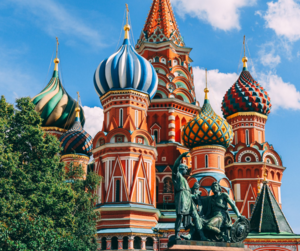Surveillance Database of Journalists to Be Compiled in the USA. Where Is the Outcry?

The Department of Homeland Security (DHS) is looking for contractors to build up a Media Monitoring Service. Details seem to be based on instructions by George Orwell: The DHS asks for the ability to scan more than 290.000 news sources within and outside the US, and store "journalists, editors, correspondents, social media influencers, bloggers etc." in a database that must be searchable for "content" and "sentiment".
Standard PR practice or beginning of total surveillance?
The DHS may claim that such a Media Monitoring Service is "standard practice of monitoring current events":
Despite what some reporters may suggest, this is nothing more than the standard practice of monitoring current events in the media. Any suggestion otherwise is fit for tin foil hat wearing, black helicopter conspiracy theorists. https://t.co/XGgFFH3Ppl
— Tyler Q. Houlton (@SpoxDHS) 6. April 2018
Some journalists, however, believe it is time to ring the alarm bells. Michelle Fabio describes the Media Monitoring Service as "potentially dangerous territory with the government keeping track of the 'sentiment' of citizens and foreign nationals".
And Sarah Kendzior tweets that "The DHS media list should be viewed in the context of the demonization of journalism, targeting of individual journalists, threats to immigrants and minorities, media consolidation and Sinclair's forced script reading, Trump's demand for loyalty oaths...".
Where is the media outcry in the US?
These two views must be taken very seriously, and American journalists in general should be much more concerned about the planned Media Monitoring System.
Up to now, not many news agencies have picked up on the story, and CNN has even supported the DHS angle in this article.
Given Trump's attitude towards journalists, the fears stated might not be far-fetched after all. It is commonly known that Trump is no fan of the media. But it seems that for a long time many did not take his outbursts of fury against media outlets such as the New York Times, the Washington Post, CNN and others seriously enough.
These outbursts cast a very dark shadow on the planned Media Monitoring Service. And the potential of this institutionalized monitoring is devastating.
Media Monitoring Service could threaten freedom of the press
Trump's daily attacks against the media already follow typical mechanisms of autocratic systems: Trump uses official channels to bash critical media or to disturb their political work.
At the same time he promotes media organizations that report favorable about the government such as Fox News and local TV channels. In the end, one loses the overview of what is the truth, what is Fake News, and what is governmental propaganda.
For his fight against the media, Trump uses not just Twitter, but also his political power.
The Amazon - Washington Post example
Trump is repeatedly lashing out against Amazon for avoiding taxes and for making profits while ripping off the American postal services. Whether his accusations are true or not, does not really matter. The repeated accusations are directed against Jeff Bezos.
The reason for this is most likely that Bezos has bought the Washington Post in 2013, which Trump is regularly accusing for publishing Fake News. While the Washington Post keeps its critical reporting up, the Amazon share has already been affected by Trump's accusations.
Lawsuit to pressure the media
The US Justice Department has filed a lawsuit in 2017 to stop AT&T's takeover of Time Warner because the acquisition would violate antitrust law.
The motivation, however, might lie elsewhere: Time Warner is the parent company of CNN, which Trump regularly accuses of reporting Fake News and of being "anti-Trump".
The lawsuit is being used to pressure AT&T to sell CNN. Some even suspect that the lawsuit is directly being used to pressure CNN and its way of reporting.
Interested in buying CNN would be Rupert Murdoch, who owns the pro-Trump sender Fox News. If Murdoch should buy CNN, he would own two of the three big US news channels.
Local television market
Less know, but very important in the US media landscape, is the Sinclair Broadcast Group. The Group operates 193 local TV stations which make it the largest TV operator in the USA. The Group plans to buy another 40 local TV stations, which would mean that they would broadcast to almost three quarters of all US households.
The government has not only no objection to this monopole, the FCC has recently eased off regulations to allow such a deal.
The Sinclair Broadcast Group is pro-Trump. Its moderators have to read out identical manuscripts and play the same video clips on all channels. The Chairman of Sinclair Broadcast Group is supposedly in contact with Trump's former strategist Steve Bannon and Sean Hannity, a vocal Trump advocate and moderator on Fox News.
Freedom of press is under attack worldwide
The current development in the US is very worrisome, particularly as the freedom of the press is under attack worldwide.
Reporters without Borders state: "Once taken for granted, media freedom is proving to be increasingly fragile in democracies as well. In sickening statements, draconian laws, conflicts of interest, and even the use of physical violence, democratic governments are trampling on a freedom that should, in principle, be one of their leading performance indicators."
The Freedom of the Press Report 2017 by Freedom House concludes that global media freedom has reached its lowest level in the past 13 year. This is not only down to "further crackdowns on independent media in authoritarian countries like Russia and China." The report also blames "new threats to journalists and media outlets in major democracies".
The report explicitly blames Donald Trump: "It is the far-reaching attacks on the news media and their place in a democratic society by Donald Trump, first as a candidate and now as president of the United States, that fuel predictions of further setbacks in the years to come."
The United States government, traditionally one of the bastions of press freedom, is now warming to the idea of controlling the media and trying out different measures to influence the US media landscape.
Freedom of the press must be protected
The upcoming Media Monitoring Service is yet another step towards all-round surveillance of journalists. As soon as pressure is added, this could turn into a real threat to undermine the democratic system of the United States.
Sadly enough, German history is a very good example of how surveillance has been used to undermine democracy in the past. This is why we have to call on everyone to fight for ending mass surveillance.
Putting the facts together explains why Reporters without Borders and Freedom House are so pessimistic:
- The current US President does not respect the freedom of the press.
- The current US government uses their power to influence the media.
- Media outlets and journalists are to be put into a detailed surveillance database.
It is time to fight for the freedom of the press now. Once this freedom is gone, it will be so much harder.
Final thought
Will this post put ourselves in the Media Database? Possibly. We are ready to take the risk and so should every journalist. If we wouldn't, it would be self-censorship - one of the most powerful tools of a surveillance state.

No comments available










